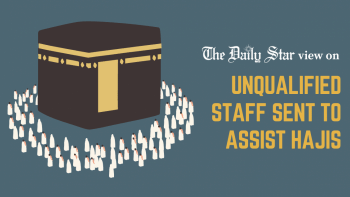Reduce the costs of hajj packages

It is unfortunate that as the registration deadline for the 2025 hajj has passed, around 51,000 hajj quotas still remain unfulfilled. Reportedly, despite efforts from both the government and private agencies, only 4,800 prospective pilgrims under government management and 71,800 under private management completed their registrations by the December 15 deadline. Reportedly, although the government extended the deadline thrice since November, it could not attract more people to register due to the rising costs associated with hajj packages. This is concerning because it will adversely impact the businesses of private hajj operators in the country, while for the aspiring pilgrims, their spiritual journey to Makkah and Madina will remain a distant dream.
Several factors have reportedly contributed to this situation. While the high registration cost has been a significant deterrent, the distance of accommodation and increased food costs have also discouraged many from registering. Reportedly, while the general package for a Bangladeshi pilgrim costs Tk 5.23 lakh and the special package Tk 7 lakh under private management, the government-managed packages begin at Tk 4.78 lakh, with an additional package available for Tk 5.75 lakh. These prices represent a reduction from last year by Tk 1 lakh and Tk 11,710, respectively. This year, however, the cost of food—Tk 40,000—is not included in the government's hajj package. While pilgrims under the government package were previously kept within 1.5 kilometres of the Haram Sharif, this year the government tried to reduce the price of hajj packages by arranging accommodation three kilometres away from the Haram Sharif. This has created significant challenges for the elderly people. Additionally, the requirement to pay a substantial amount upfront—Tk 3 lakh for registration—is particularly challenging for those from rural areas who often gather the required funds by selling assets over time.
To address the situation, the government and private hajj agencies must urgently consider further decreasing the package costs and introduce more flexible payment options. The government should also consider extending the deadlines for registration while working closely with private hajj agencies to offer financial assistance and reduce the upfront costs. Additionally, ensuring that accommodations are within a reasonable distance from the Haram Sharif will significantly aid the elderly pilgrims. We hope the government will create an inclusive and financially accessible hajj experience, ensuring that all intending pilgrims can fulfil their religious obligations without facing undue financial burden.


 For all latest news, follow The Daily Star's Google News channel.
For all latest news, follow The Daily Star's Google News channel. 



Comments